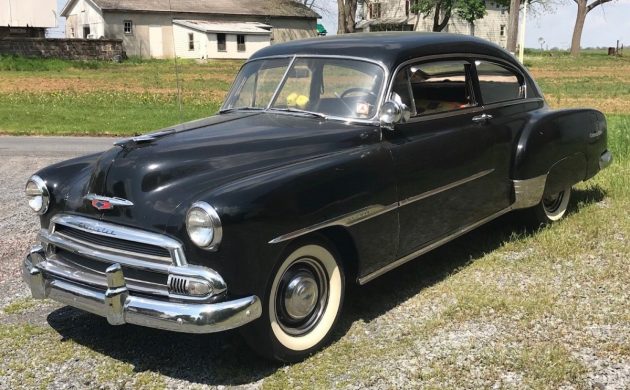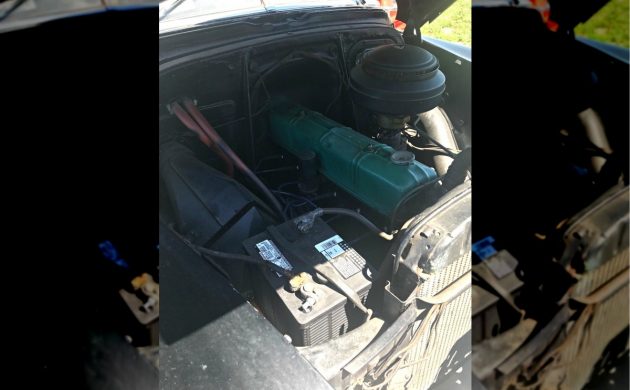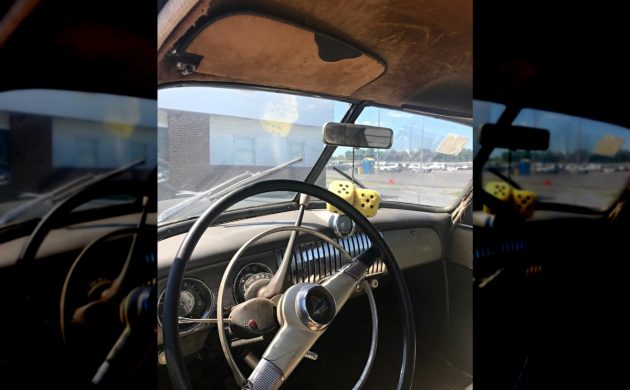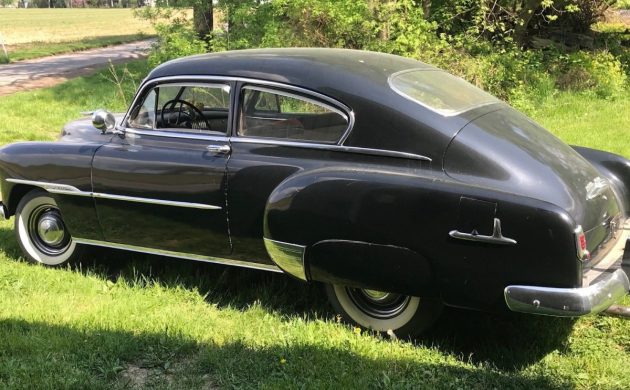Clean, simple, stylish, and to the point, this Chevrolet Fleetline is a great classic that needs little and is ready to roll. This is a one family vehicle that is thought to have covered only 81,000 miles in its lifetime. While Chevrolet Stylelines are somewhat common, this Fleetline is a neat find that is in wonderful condition. With a few days remaining in the auction, bidding has risen to $4,600. Check it out here on eBay out of Lancaster, Pennsylvania.
The 216 inline six is a stone reliable engine, which needed little work to be revived after spending some time stored. The seller acquired the car and promptly dropped it with a shop to get it going once again. A new fuel tank, carb rebuild, and a tune up revived the engine and a brake overhaul got this beauty to “slow its roll” once again.
Very original and in fair condition, the interior isn’t perfect but has aged reasonably. The headliner is burned up, as is the top edge of the back seat. There is also some staining to be found on the door panels, as well as on the seats. The driver side of the bench is torn, which is really a shame as this interior isn’t too shabby overall. I say that the interior needs an overhaul to match the vehicles exterior appearance.
While the exterior is quite nice with no major issues, I am just ever so slightly suspicious that this car has been repainted in its lifetime. While the seller claims that the car is original, I am not completely sold on that concept as there is orange peel in the paint, and the quality of the paint finish around the windows and trim just doesn’t look right to me, although it could be an illusion. The only significant issue to take away from the exterior is that there are some paint chips along the driver door edge, and there looks to be some hazing/hard water stains on the hood. Beyond that the chrome and glass look great, and this Chevrolet is a sweet find that could be maintained for quite a long time in a nice garage. Are you a fan of this Chevy Fleetline?









I know on this site Geomechs is the final word on these Chevies, so I have to ask Geo first is the blue flame still considered a stove bolt engine or it the next generations? Secondly were the bearings still pored babit or bearing shells? And thirdly was this engine still a dipper in 51 or was a full pressure engine by then? To me this looks like a bargain, something you could be driving while you worked on reviving the interior and possibly repainting at some point. I love the sloping back but I’m not crazy about the colour. I have a black motorcycle and it looks good but every spec of dust shows on that thing. It just seems like a lot more work to keep it looking good. This example looks to me like a three on the tree which is the way I’d want it. Hopefully we can get Geomechs to chime in on this one. Nice car.
Hi Mark. I guess I’m going to have to get a membership to get notifications earlier. This one just came on, for me anyways, at 10:30 MDT. Now, to answer your question(s). Chevy poured babbit until ’53 when it went to full pressure lube across the board. Both the 216 and early 235 (light duty–w/Poweglide) were that way, including the splash dippers and the anemic 30 psi system, which, like my ’49, is lucky to make 15 hot. I might add that I’ve seen heavy duty 235 (truck applications) use full pressure lube earlier than the cars and light trucks did. But they were still babbit pounders until ’53 (or until someone decided to upgrade to precision insert bearings).
The Stovebolt engine was actually the original six, the three-main special, built from ’29 to ’31, and updated for ’32 and used until ’36. It got it’s name from the use of slotted head screws on the side cover. When the 216 came out, the Stovebolt name stuck and was used pretty much until the full pressure 235 family (Blueflame) came out in ’53. Some will claim that the Stovebolt term was used until the end of ’62 when the 230-292 came out. Some even refer to the latest ones as Stovebolts, so it depends on who you’re talking to at the time.
Another interesting thing is that the ‘Blue Flame’ combustion chamber was developed in 1914 with the first ohv Chevies.
This car, unless the engine was changed, is likely running a 235. Chevy used the 235 ahead of the Powerglide because the automatic used everything that poor Stovie could give. Interesting that the 216 was rated at 92 hp and the 235 was something like 96; I don’t think it made the 100 mark. I’d love to have this car at my place. And I’d drive it, enjoy it, and fix it up along the way.
Good catch on the 235 and the powerglide Geomechs. I noticed that too, but you beat me to it. 1952 was the last year for the 216 with the stickshift. In 53 the 235 was the only engine available, only the standard got one with less horsepower. I believe it had solid lifters too.
I remember learning all this info from Dad n Micky 60 years ago. Brings back good times.
I made the mistake by going with the Ford V8
Thank you Ed
Thanks Geomechs for the schooling. I figured this car would be right up your alley. You should get a membership right know there about 15 to 20 cars we are looking at that you are not I really like having my membership it was totally worth it.
I remember reading years ago that the Powerglide equipped engines came with larger intake valves as opposed to the ones that came with the stick shift cars,the featured ’51 appears to be a Powerglide car as well.
Roger,
My manual ’51 was a 216; I thought all the power glide cars were 235s.
I had a stock ’51 Styleline Deluxe 4 door, equipped w/ the 235 & Powerglide drivetrain…(Mayland Black, like this one.) The 235 actually was rated @ 105 HP…..oh, yes, can’t forget that being a Powerglide model, it was equipped w/ the 355 rear. Very fun car just as is IMHO😉
It appears to have the P-Glide transmission, so it least it won’t get stuck in Second when the shift linkage wears, which it will….
I had a ’50 hardtop to drive when I first got my license: Earl Scheib pea-soup green, with seat covers by Pep Boys. Not a bad ride, all things considered, even though I wished my grandfather had bought a Fleetline instead!
If I went for this, I’d keep it stock but would have to buy a second just like it to paint Kandy-Apple Red, lower, add lakes pipes, wide whitewalls and spinner hubcaps. That’s the inevitable consequence of growing up near East L.A., where such cars were more common than stock versions.
I put those ‘56 Olds spinners on my ‘53 Bel Air convertible. Looked so fine!
All Chev engines were called stove bolts still the change in 63. This one is a 235 with babbet besrins and splash oiling. First full pressure oiling was 1953 235 with a power glide trans. Good looking find.
Sweet car! I love the styling of the ’49-’51 Chevys. I dreamed long and hard about one of these in 1978. It was for sale, running but a bit rusty and with no heat, for around $150. I ended up with a VW Beetle in similar condition for the same money instead.
Too bad it didn’t stay with the original family. I doubt there are many functioning vehicles this old, still with the original family.
This is an awesome deal. Any one of us could drive this car until we die. There is nothing we couldn’t fix. BUT, get rid of those rear fender skirts, gross…
Agree, on those fender skirts!!!! My ’49 Styleline Deluxe came with skirts and the best place for them is hanging up on the wall of my shop…
Mine rusted off…
I think I’m in love…
My very first car at 16 Y O was a red convertible 1952 with black top. it was the 216 engine with slushamatic, ( power glide ) transmission. The owner of this fleet line states it will do 80 miles per hour. He forgot to mention that it was probably going down a 45 degree slant downhill.I just was at a local auto show where a guy had a beautiful 2 tone 1952 4 door Chevy equipped with the power glide and said his car also accelerated very sluggishly also even having the engine and tranny rebuilt.
A beautiful car…redo the interior in the original materiels and fix it as you go along. I love the front ends on these pre ’53’s…so sano…..
The 1950 Coupe has better lines…
And yes, that is a stock front suspension with drum brakes.
The man behind the wheel is 83 years old!
Yes the 49-50’s had a better looking swooping rear fenders with the tail lights in between the trunk an fender. This one was mine from 1968-2008!
And now with new owner!
Like visiting an old friend. Being a child of the late ’50’s and all of the ’60’s, I grew
up seeing these cars everywhere as my hometown was full of ’em. Seemed like
everyone you knew owned one of these
or knew someone who did. And when it
came time to get your license, this is
what you got for your first car. By the
mid ’60’s, you could pick ’em up all day
long for less than $100.00. One of my
first cars was a ’52 DeLuxe 4-door sedan
I bought for $10.00! The farmer who had
it told me straight up that it would need a
new master cylinder (under the driver’s
side floor) and didn’t want to fool with it.
Yes, it was a real barn find down to the
thick layer of dust and chicken doo that
covered the whole car. My Dad and I drove it back to our house using the E-brake to slow it down and stop it. A
friend of Dad’s followed behind us in
his ’51 Lincoln coupe just in case we
broke down on the way home. All we did
was tune it up, add gas and go. It wasn’t
fast but it took my kid sister to school for
the next two years ’til the engine spun a
bearing and I swapped in a 230 straight
six from a friend’s ’64 Biscayne sedan after that car was stripped by vandals
after it sat overnight in a rough part of town. You should’ve seen the looks we got when we’d pull into a campground
pulling an Airstream travel trailer behind
it. As the Visa ads said: all those strange
looks were priceless! Sold it not long after that to a friend who still drives it to
this day. Good times.
I have a black ’50 Fleetline in my project que…I think its a timeless,stylish design and I look forward to rolling it into my shop
My second car was a black Fleetline four-door. Not a real cool car for a 17 year-old in 1957, but even then four-door Fleetlines seemed rather uncommon. Today, they are veritable hen’s teeth.
Mine was the three-on-the-tree with the 216. It used to stick in low gear as you moved the lever to what should be neutral. The only answer I knew was to declutch and coast to some place where you could open the hood and pull the lever up at the bottom of the steering column. My dad’s ’51 Mercury did the same thing as did my ’64 Chevy years later.
@Allen Bachelder. The English Ford Zephyr 6 had a 3 speed column gear change and was exactly the same. It never gave trouble until you tried to change gear in a hurry.
Oh Ken, I think you struck a soft spot. I was a a kid in a “hurry” to get all the wild driving out of my system before I might outgrow it. No, I don’t think my dad’s Mercury ever did it until I started driving it either.
An upperclassman in highscool drove one of these with a “Corvette” engine or a Chevy V8 with cast aluminum valve covers. Who knew back then (1960). Coolest car I had ever seen and boy did I lust after this car. Too bad my barn is full.
My dad had one (back in the day) & they are great cars!
I do recall that while these things would wind like crazy at anything much over 60 mph, they felt pretty responsive accelerating through first and second gears. Rather fun, I thought. Of course my basis of comparison was my previous tired ’37 Plymouth.
Love the fender skirts!
All the GM “Torpedobacks “, are wonderful! They just plain look good.
She brought $13,100 that is a lot more than I would have expected for the over all condition it is in.
‘ Gotta correct my previous observation. I said “over 60 mph” when I should have said “UNDER 60 mph”. Mine was pretty quick getting away from a stoplight in first gear. It was better than OK in second, and something less than “fun” in third.
I think it was often said about these car that you could drive them all day at 65, but go to 70 and they’ come apart. I always drove mine at least 70+ mph and it did stay glued together, but the guy who bought it from me lost the timing gear about a week after the sale. If I recall correctly, these engines had fiber timing gears (sprockets?) that were in the habit of self-destructing. I don’t know what the stock rear end ratio was for these cars, but mine revved like crazy on the highway.